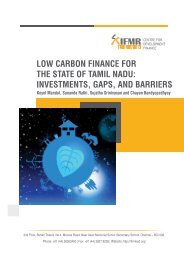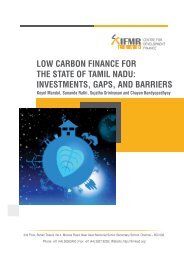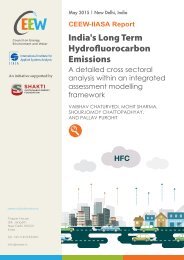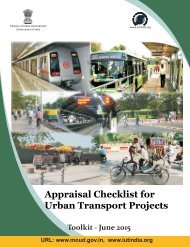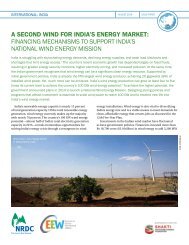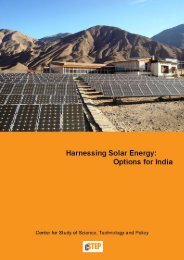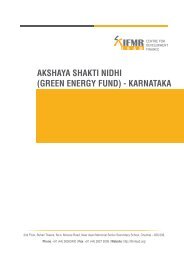Enhancing India’s Readiness to Climate Finance
India has taken several steps to improve its national response to climate change. India’s climate finance requirements, however, are very high, and will need to be met through a combination of public, private and international climate finance. See more at: http://shaktifoundation.in/
India has taken several steps to improve its national response to climate change. India’s climate finance requirements, however, are very high, and will need to be met through a combination of public, private and international climate finance. See more at: http://shaktifoundation.in/
- No tags were found...
Create successful ePaper yourself
Turn your PDF publications into a flip-book with our unique Google optimized e-Paper software.
<strong>Enhancing</strong> <strong>India’s</strong> readiness <strong>to</strong> access and deliver international climate finance<br />
institutions, and proven financial management capacity will receive greater volumes of climate finance<br />
in the future.<br />
The purpose of this report is <strong>to</strong> identify opportunities for India <strong>to</strong> strengthen its ability <strong>to</strong> effectively<br />
access and deliver increasingly large volumes of climate finance from international public and private<br />
sources, in order <strong>to</strong> meet its national climate change policy objectives under the NAPCC. The report<br />
examines the international climate finance landscape, <strong>India’s</strong> experience in accessing international<br />
climate finance, national policies <strong>to</strong> address climate change, and the effectiveness of <strong>India’s</strong><br />
institutional management of climate change. Specifically, the report uses a climate finance ‘<strong>Readiness</strong><br />
Framework’ which analyses these main <strong>to</strong>pics, in order <strong>to</strong> make an assessment of the strengths,<br />
barriers, and gaps in <strong>India’s</strong> ability <strong>to</strong> access international climate finance. This analysis provides the<br />
basis for a series of constructive recommendations that will guide policymakers and other<br />
stakeholders in how <strong>to</strong> improve <strong>India’s</strong> ability <strong>to</strong> access and deliver future flows of climate finance.<br />
In conducting this analysis, the report is driven by the following research questions:<br />
<br />
<br />
<br />
<br />
<br />
What main trends will drive climate finance flows (in India, and more broadly in the<br />
international arena) over the next 5 years?<br />
What funding streams will be particularly important for India (focusing on easy wins in the<br />
short-term and longer-term funding streams that can catalyse transformative change in India)?<br />
Where has India performed well, and how can these successes by replicated and scaled-up?<br />
What capacity gaps remain in accessing and delivering international climate finance?<br />
What institutional changes or new requirements are needed for accessing future international<br />
climate finance?<br />
1.3 Approach<br />
The report was developed over four complementary stages <strong>to</strong> ensure that feedback was integrated<br />
in<strong>to</strong> the final report.<br />
1. Conducting desk research on <strong>to</strong>pics that included:<br />
− <strong>India’s</strong> performance in accessing international climate finance.<br />
− Donor priorities for climate finance spending in developing countries.<br />
− Existing climate finance readiness frameworks, and their appropriateness for India<br />
− Lessons from peer countries.<br />
2. Individual interviews with key experts and stakeholders representing the Government of India,<br />
multilateral financial institutions, bilateral funding agencies, the private sec<strong>to</strong>r within India,<br />
Indian research organisations and think-tanks, and climate finance readiness researchers<br />
working at the international policy level. These interviews were essential in validating the<br />
climate finance readiness framework that was developed through desk research, and applying<br />
it <strong>to</strong> the Indian context through expert analysis.<br />
3. Discussion and validation on the interim project findings on <strong>India’s</strong> climate finance readiness<br />
with a wide stakeholder group in Delhi on 2 nd May 2014. This input was integral in developing<br />
the report’s main recommendations outlined in Chapter 7.<br />
4. Follow-up interviews with key Indian experts <strong>to</strong> validate the report recommendations in June<br />
and July 2014.<br />
1.4 Scope of the report<br />
The report is structured around the following parameters:<br />
<br />
The report will focus on climate finance for mitigation – targeted at low-carbon development<br />
policy options such as renewable energy, energy efficiency, transport, etc.<br />
Ref: Ricardo-AEA/R/ED59216/Final Report<br />
2




